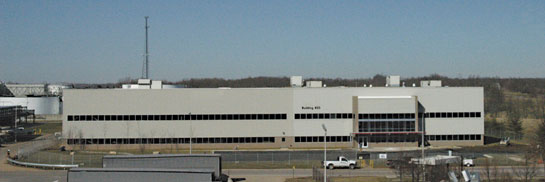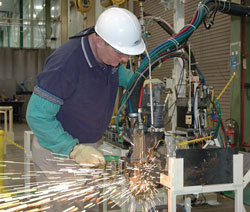KENTUCKY SPOTLIGHT
 |
|
More Choices
|
Toyota's $12-million North American Production Support Center opened in Georgetown in February 2006. Its 29 employees will coordinate training efforts to support the company's entire portfolio of North American plants. |
 |
| A |
new right- to- work push, under the moniker of "employee choice," hovers in the air in the Kentucky state capital of Frankfort, even as the state's incentives programs undergo renewed scrutiny. With Kentucky continuing to languish in several economic categories like per capita income, average wages and university R&D, some say right- to- work is where the money is.
"To not have employee choice is to send economic opportunities – well- paying jobs – to states like Tennessee, North Carolina, South Carolina and Georgia, among others," said Gov. Ernie Fletcher in announcing the push in January 2006. As proof of the need for such a measure, his administration points to Bureau of Labor Statistics data indicating that personal income grew at a rate of 37 percent in states with employee choice, compared to 26 percent in states without employee choice. Others question whether that greater personal income is going to workers.
Leading the charge on Fletcher's behalf is Fred Mudge, current chairman of R.J. Corman Railroad Group, LLC, and formerly president and CEO of Logan Aluminum in Russellville, Ky., as well as COO and executive vice president of Commonwealth Aluminum in Louisville.
The employee choice initiative was unsuccessful in getting the state House and labor committee to properly address the issue, says Mudge. But he says two surveys have shown that seven out of 10 voters are in favor of giving employees the freedom to choose whether to join a union or not.
Mudge speaks from experience. "Logan is in fact a union-free operation, and was located in that community because of that positive environment in that part of the state," he says. "At Commonwealth, in Lewisport, that plant was unionized by the steel workers, and I would guess employee choice would not fare favorably in that location." However, he says, nearby Owensboro has a favorable environment with regard to employee choice.
"We view it not as a sprint, but a marathon," he says of the employee choice push. And the benefits go beyond pumping up per capita income. "Had we had it 10 or 20 years ago, the General Assembly wouldn't struggle with the budget as much as they do," Mudge says, indicating that education initiatives, for one, would stand to gain traction.
In the meantime, he says his former industry is doing fine in the state, helped along in part by Kentucky's low energy costs and the continued flow of automotive investment to Kentucky.
Low energy cost was at least one driving factor behind the choice by Dow Corning to invest $60 million in its Carrollton complex, after the site came in a close second for the company's Hemlock Semiconductor plant that went to Michigan. Hemlock's analysis had found that Kentucky's energy costs were as much as 30 percent less.
